-
Key Takeaways
- AI systems have no good or bad days, unlike humans who are influenced by stress, personal biases, and emotions; they operate consistently and deliver identical outcomes all time.
- AI is best at repetitive and data-driven tasks whereas humans are best to take complex decisions that need creativity, intuition, and ethical considerations.
- These systems may process millions of data points in seconds rather than humans who take hours or days to analyze.
- AI decision-making changes each sector from healthcare to entertainment.
- While implementing AI, it demands careful consideration of ethical implications, data quality and organizational culture.
How AI Decision-Making Is Transforming Industries Across the Globe
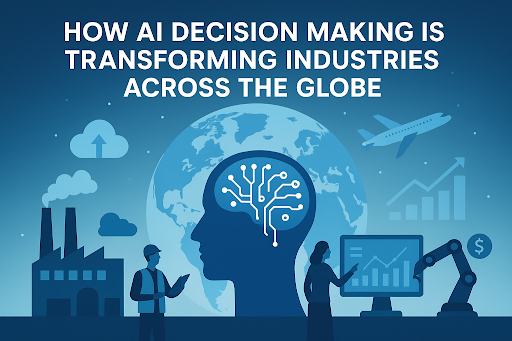
The business world is changing fast now. Companies wrestle with critical decisions daily. Traditional decision-making processes increasingly seem inefficient and do not capture critical insights. This is where AI decision making proves to be revolutionary– especially when implemented with the help of the best AI development company in USA that understands both technology and strategy.
Decisions made by AI are a vital part of modern business processes all over the world. Rather than taking hours going through data, AI can process millions of data points in a matter of seconds, enabling data-driven decisions through automation.
The banking industry is a fine example of this. AI-based systems are already in use for loan approvals, analyzing spending habits, and credit scores in a fraction of the time with far more accuracy than a human could. AI is also utilized by online stores such as Amazon for product recommendations based on previous purchases.
The change within the healthcare industry is equally impressive. AI's use in radiology is already commonplace for X-ray and MRI image interpretation. Furthermore, AI systems are already in use for planning procedures and prioritizing emergency room patient triage. AI market will grow from $39.25 billion in 2025 to $504.17 billion by 2032.
The industrial landscape is also evolving. AI is already utilized for predictive maintenance, as well as monitoring quality control in manual and automated production lines. AI-powered route optimization by UPS is widely cited as an industry benchmark for automated, data-driven logistics.
AI performs with full consistency and does not suffer from fatigue, emotional breakdowns, etc like humans. Moreover, the technology guarantees consistency in decision quality at all times.
The exploration of creativity and ethical considerations is still the domain of humans. The most optimal outcomes are achieved when humans set their minds to intricate problems demanding creativity, judgment, and critical thinking, while AI manages to deal with menial and repetitive tasks. AI will drive 95% of interactions by 2025.
Today, firms all over the world are realizing that AI decision-making is not just a tech craze; it is a necessity or requirement now. Artificial intelligence is now being deployed by all kinds of enterprises, ranging from small startups to large corporations, to make decisions more quickly, more accurately, and with greater precision.
Consider the fact that while human managers may take hours or even days to analyze data and make pivotal decisions, AI systems can check through millions of data points in few seconds. This transformative capability is now aiding the reconfiguration, competition, and servicing of clients by entire industries.
What is AI Decision Making?
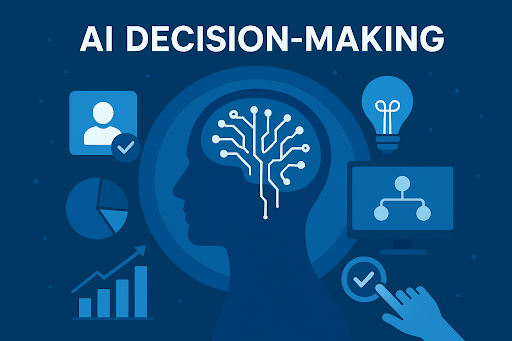
AI decision-making is the method where a computer system, within a business organization, utilizes AI technology to evaluate data, determine relevant data patterns, and make decisions with minimal human operator input. Instead of relying solely on human judgment, businesses are now turning to smarter algorithms capable of dealing with huge volumes of data and recommending or even automating decisions.
This technology has the benefits of an assistant who is super sharp and considers a thousand factors at the same time, never tiring or having bad days. When compared to human agents who may be emotively swayed or subject to personal biases, AI decision-making systems algorithmically compute purely data-driven and bias-free logic.
The beauty of AI decision-making technology is the lack of deviation. In contrast to humans, who at times may be taken away by the stress of the moment or an entirely subjective personal experience, AI systems operate under the same pre-set parameters, offering identical outcomes. This reliability is the primary reason an increasing number of companies are turning to artificial intelligence for strategic business processes.
The only technology that can accurately classify or identify sounds and images is AI. AI and Machines learning that have been fed data and programming can only perform basic tasks. Steps taken to AI decision-making further enhance its power.
To appreciate this technology, its processes must be understood. AI systems have the potential to align decision-making processes. In every business, strategic decisions must be made at some point or another.
For instance, the AI systems' approach to solving problems begins with the collection of data. This problem can be caused by the business as well. AI systems have the potential to enhance an organization or business to avoid trivial customer behavior data. Market trends are another factor, and so is financial information. All other data matrices are equally relevant.
Next, the AI evaluates the present circumstances against historical benchmarks to forecast possible futures. For instance, a retail business estimating the appropriate inventory to purchase will require the AI decision-making systems to evaluate historical sales data, current trends, seasonality, and even the weather or economic activity.
The system would then provide an estimate, or an automated decision would be rendered based on the preset criteria and goals of the system. AI systems for decision making are diverse; some suggest auxiliary reports while others are capable of making autonomous decisions up to a certain level.
Ultimately, the AI evaluates the impacts of its decisions and learns from them. The system retains a successful strategy if a decision leads to positive outcomes. AI revises its methodologies if some actions do not yield optimal outcomes. Such approach helps in growing in intelligence over time.
Also Read:
The Impact of AI on Software DevelopmentWhat are the impacts of AI seen in decision-making?
The applications of AI decision-making are many, and many more are emerging. Let us look at some examples from different industries to illustrate the impacts of this technology.
In the banking industry, AI algorithms are used to automate the loan approval process. AI includes credit scores, income data, spending patterns, and hundreds of other relevant data points in minutes, in comparison to the days or weeks manual application reviews take. This makes the process more efficient and enables faster approval for customers, and also helps mitigate risks for the banks.
In e-commerce, companies rely more on AI decision-making for tailored recommendations. While shopping, the phrase “shoppers who bought this also bought” is a perfect illustration of AI in use. To offer tailored recommendations, the systems analyze millions of purchase patterns to suggest high propensity to purchase products.
AI systems make quick and more precise decisions when inspecting products, making automation prevalent in quality control inspection. Known as the smart camera and sensor systems, these automated systems surpass human workers in both speed and precision, and also have the capability to make decisions on whether the products comply with the pre-set quality standards or not.
In the area of transportation, AI systems will be making decisions regarding route smart optimization. AI technologies are used by companies such as UPS and FedEx to optimize routes for their drivers & reduce expenses while improving customer satisfaction.
The applications of AI technologies in real-world situations serve to illustrate the influence that AI technologies have on society. Each Netflix user has an individual profile where shows and movies are recommended based on previous viewing patterns. Netflix’s AI system evaluates hundreds of thousands of profiles and screens to recommend the content that matches the user’s preferences.
Amazon’s efficiently organized warehouses are now a showcase of advanced AI robotics in action. Each robot selects the items that should be picked based on the inventory. Additionally, they set the items in the appropriate order. Furthermore, each robot evaluates the quickest routes to take within the warehouse. All these choices are made thousands of times a day, enabling the service level that Amazon promises to its clients.
Decisions made by smart systems with AI technologies in agricultural farming relate directly to AI decision-making. Advanced AI systems set the appropriate times to water, harvest, and plant the crops. Such actions are made possible through weather data, soil condition analysis, and plant health evaluations. With all the collected information, AI technologies make agricultural decisions with maximum yields and minimum resources.
Trading in the stock exchange is one of the most advanced AI decision-making systems. Analyzed data from previous trades, stock numbers, the latest news, and economic trends can all be processed to make a buy or sell decision in seconds. Although these systems require extensive resources to gather information and make trades, the speed at which they operate far exceeds the capabilities of human traders.
The broad scope of AI applications in decision-making has the potential to save lives and improve patient care. AI in healthcare shows some of the most effective and impactful uses of intelligent systems.
Physicians utilize AI decision-making in healthcare for diagnosing issues more rapidly and with greater precision. AI technology has the capability of interpreting healthcare images such as X-rays, MRIs, or CT scans and identifying the same diseases that practitioners sometimes overlook. For instance, during the reading of mammograms, AI is capable of identifying the nascent stages of cancer with precision that is, more often than not, superior to that of human radiologists.
AI decision-making in healthcare is also instrumental in aiding with the planning of treatment. Advanced systems are capable of synthesizing a patient's medical portfolio, current clinical picture, genomic data, and treatment responses from other patients to recommend the optimal course of action. This strategy, in turn, results in enhanced outcomes and reduced adverse effects owing to its tailored nature.
Patient care in the emergency department or emergency room is a major beneficiary of AI decision-making in healthcare. AI systems have the capability to quickly evaluate and simultaneously compare a patient’s symptoms alongside their medical history to assess who has the greatest medical need and who can wait in a queue. This method of prioritization for patients who are higher acuity has the potential to be life-saving in very busy emergency departments.
Pharmaceutical firms are utilizing AI to evaluate millions of chemical substances for potential medications in what is now a months-long process, previously spanning years. This is one more example of AI decision-making in healthcare, which remains unexplored.
Decision-Making Tools Utilizing AI
Currently available AI frameworks simplify the execution procedures of modern enterprises. These frameworks differ from basic mobile applications to sophisticated and comprehensive ecosystems.
Examples of the more simple and sophisticated AI decision-making tools are business intelligence systems, which aid in analyzing sales data and even making marketing suggestions. AI applications such as Tableau and Power BI are capable of uncovering and analyzing different patterns in data, spotting trends, and suggesting appropriate actions.
Another example of AI decision-making tools is the Customer Relationship Management Process (CRM) systems. Salesforce, uses AI to assist sales teams in making critical business decisions, such as which leads to contact from their databases, the best to contact, when to contact them, and the appropriate products to pitch.
For project management, AI decision-making tools may give assistance in resource allocation, estimating timelines, and risk evaluation. These systems can forecast project outcomes, detect problems in advance, and propose algorithms to keep the project from derailing.
AI Decision-Making Applications
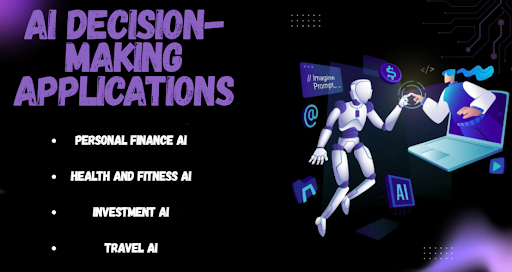
Mobile technologies have engendered a plethora of AI decision-making apps that place powerful decision-making tools in the user’s pocket. These apps extend AI accessibility to individuals and small businesses that previously lacked access to low-cost system-level NP technologies.
AI Decision-Making Pros and Cons
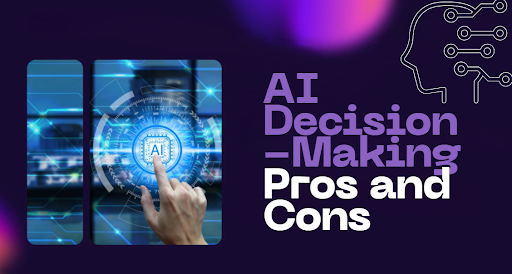
Pros and cons of AI decision-making systems are like any other technology; they need scanning at every facet of consideration at every level before putting them into use. Not every technology comes down to a ‘one size fits all’ approach. It is very clear at this point in time that every business is trying to come to a conclusion for shrouded decisions of whether, in fact, business systems based on AI should be adopted.
Typical advantages and disadvantages of any technology are discussed with the thought that AI systems can process and retrieve critical information with accuracy in every decision. For high-paced industries where competition is cutthroat and responses to any and every query are a necessity, AI systems can be life-saving. Every technology comes with its own downsides. For instance, AI systems seem to process and retrieve critical information at blindingly fast speeds. And for the same reasons, AI systems can be detrimental at the same time. Wrong guessing or relying on incorrect information can cause far greater damage, shifting the business into an inescapable rut that very few systems can recover from.
AI systems have proven over and over again that for high-paced companies, a technology that AI systems spring can pull the weight on analyzing streams of data can be invaluable for high-strung systems. At the same time, AI systems have to contend with the nature of fast-paced systems, which meekly dictate and evaluate any misplaced decision not just for themselves, but also for other systems. Quant companies, on the other hand, are AI systems that are an eatable solution to the traffic of empirical data. For small businesses, vehicles to drive operational and productivity metrics on a balance sheet can be prohibitive, even while at ease, small and individual businesses depend on sound accounting for every point relied on.
The human component integrates aspects of pros and cons trade-offs in AI decision-making systems. Unlike human systems, AI lacks the capability of intuition, creativity, or ethics. More importantly, the human element does allow AI to improve decision-making by defying human bias, emotions, and other irrelevant attributes that lessen the quality of a given decision.
Businesses and organizations stand to gain in many ways when understanding how AI improves decision-making. The impacts of AI systems go far beyond simple automation; it replaces the need for human labor and allows for simpler in-person to in-person systems.
The work and role of AI in business strategy start with data. The collection and usage of data is a key driver in each and every AI-supported system. In humans, consideration is thankfully highly regarded. Unlike human decision-making, AI systems are trained to analyze and consider thousands and even millions of decisional attributes simultaneously. Going through each of the attributes makes analysis of the entered data without comparisons and spotting uncaptured variables.
In fast-paced industries, how does AI improve decision-making to become speed? Responding to a need or emergency for response makes many accept how AI systems are operating. The snapshot of the need to consider perception in stock trading, emergency response, and other similar industries that compute and provide response input in less than a millisecond is a big, big difference.
Understanding consistency illustrates improvement in decision-making at an organizational level. Like human decision-makers, an organization’s AI systems function according to given parameters. Unlike humans, AI has no concept of a good day or a bad day. Because AI systems apply the same logic and criteria consistently, they can be reliable and effective in the realm of loan processing and quality control, which rely heavily on fairness and consistency.
Predictive capabilities demonstrate decision-making improvements AI systems can offer by looking toward the horizon in addition to the rearview mirror. Businesses can go through trend and pattern analysis, which can predict future outcomes and allow proactive decisions to be made with the help of AI systems.
How Artificial Intelligence Will Change Decision Making
The future maintains the promise of more dramatic transformations in decision-making through the application of AI technologies. Presently, technologies are progressing more quickly than anticipated, which means that there are even more evolution possibilities available to businesses and individuals.
How decision-making will be affected by artificial intelligence includes advances in the construction of sophisticated algorithms that deal with multi-faceted decisions. AI systems of the future will have better context, more ethical regard, and enhance the workflow with human decision-makers.
Real-time decision-making illustrates how artificial intelligence will shift the paradigms of decision-making. AI has the potential to enhance real-time input processing, which will allow streamlined decision-making with the advent of better data processing speeds and more sophisticated sensor technologies.
Collaborative decision-making demonstrates how artificial intelligence systems will enhance the decision-making process through the improvement of human-AI collaboration. Future AI systems will complement human decision-makers by assuming the function of making simple decisions, while reserving complex or more nuanced decisions for humans.
The potential shifts to advanced decision-making systems for lesser-known organizations and individuals are referred to as democratization. It's known as the another way of saying how artificial intelligence will impact society by making sophisticated decision-support systems more accessible and affordable.
Should There Be an AI in the Decision-Making Process?
It requires deeper thought than a simple yes or no. There are varied factors to consider, that includes the kind of decision at hand, the implications of the decision, and whether there are alternative options.
>
Is there a need to incorporate artificial intelligence as the decision-maker for simple, repetitive, and data-driven tasks? Most likely. AI is at its best for rule-driven same or repetitive tasks that involve processing large volumes of data and are time-specific. These tasks manage the inventory of a firm, responding to simple and routine customer queries, and executing standard financial operations.
Should artificial intelligence (AI) be leveraged for decision-making processes that require creative thinking or ethical discernment? This question becomes more problematic. Current AI systems are incapable of understanding ethics’ nuanced elements or thinking outside the box. Human involvement is vital in these decisions.
With a clear understanding of the given risks, one can answer the question: Should artificial intelligence be used in decision-making? For decisions that are low-risk, AI mostly outperforms humans when there is a clear measure of success. For high-stakes decisions that carry vital risks, human presence becomes invaluable, and AI oversight becomes more serious.
When to Use AI for Decision-Making?
Knowing when to take advantage of AI in a decision-making thing helps organizations maximize ROI while mitigating risks. Several indicators may highlight good AI implementation opportunities.
When to take advantage of AI in decision-making is often dependent on the organizational context. AI systems require strong and voluminous data to operate. If your organization generates and possesses vast amounts of data, AI decision-making systems may harness and make sense of the data, thereby significantly improving decision-making processes.
The Importance of AI In Decision-Making
The importance of AI in decision-making within a company go up as the challenges and competition tend to get hard. Understanding these factors helps the organization to strategically prioritize where the AI budget should be allocated.
The ability to properly compete within the market places, plays an emphasis on AI in decision-making. Companies that have made some crucial investments in AI tend to reap the benefits of faster and more accurate decision-making and, as a result, outperform competitors that are not leveraging AI. As a result, there is a growing urgency for more organizations to implement AI decision-making systems.
Resource optimization shows the role of AI in decision-making in the context of sustainability as well as organizational profitability. Wastes in operations are bound to occur where resources are not comprehensively employed. An AI system can uncover operations that a human manager would skip in optimization.
In history, no AI self-preservation-oriented systems have been deployed. This shows the role of AI in decision-making in organizational and systemic risk management. Identification of a potential problem, evaluating risks, and decision suggestions to prevent consequences analysis are areas where timely organizational risk management can be performed to avert system and organizational risks.
Longitudinal decision making and one of the factors used to show the importance of AI systems in a firm is derived from the aspect of customer satisfaction. Modern advancements in AI core algorithms can be found in AI decision management systems. This can be used to provide services to the customers, respond to their requests more promptly, and enhance reliability in operations performed by the AI systems, which can be used to preserve customer satisfaction and loyalty.
Challenges of AI in Decision Making
The organizational implementation of AI decision-making systems is beneficial; however, the absence of challenges would be highly unreasonable. Every organization that seeks to have a successful systems implementation must overcome AI decision-making challenges.
Poor, incomplete, ailing, and biased data represent a core aspect and a major challenge of AI decision-making in organizations' informal structures. An AI algorithm, regardless of technological sophistication and capability, would fail in decision-making where poor AI data systems are implemented. The decision accuracy and reliability would be highly undermined.
Lack of Transparency In AI Affects Trust In The System.
AI solutions have been accused of acting and making decisions as ‘black boxes’, which creates a challenge of a lack of trust for AI’s decisions and voids possibilities for a performance upgrade.
While some companies implement AI systems in their organizations, ethical and social considerations arise alongside the implementation. AI systems might make auto-correct decisions that might be socially or ethically wrong. Decisions made involving social values and expectations require aligned frameworks.
Every organization has a defined culture or structure, which creates a problem of work and design fusion. A number of organizations have devoted a great deal of effort to designing an industry-structure fusion, assuming that, if anything, the work structure will be the need for AI decision systems.
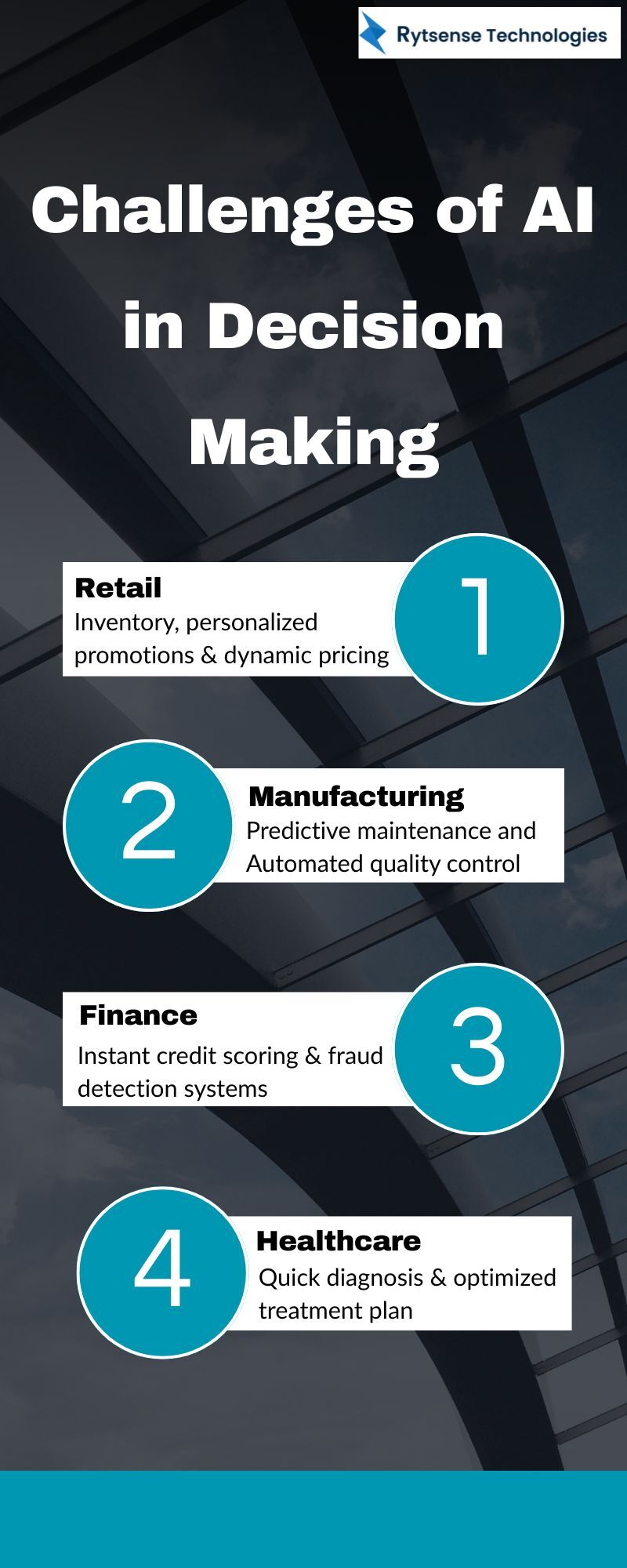
Avoid Common Pitfalls in AI Implementation
Work with the best AI development company in USA to ensure your AI solutions are ethical, accurate, and effective.
How Can AI Agents Improve Decision Making in Enterprises?
The use of intelligent agents to assist in AI decision-making is the next step in the evolution of enterprise decision support systems. These systems are more sophisticated than the previous ones as they do not stop at making recommendations, but they also manage sophisticated business processes.
An AI decision-making framework using intelligent agents is more efficient because such agents operate within given boundaries. These systems do not work the same way that traditional systems do, where the operator's control is a must at every step of the decision-making process. Such systems can make simple decisions on their own and pass more complicated ones to the human managers.
An AI decision-making framework that uses intelligent agents can be enhanced through technology because of their learning capabilities. These systems are capable of examining the decisions that they make in the scope of their operation, and as a result of this, they are capable of improving their decision-making processes. Such processes can lead to the intelligent agents making better decisions as they become more experienced.
The decision-making of an entire organization may be enhanced through the collaboration of multiple AI agents; this is the result of coordination. Agents can take on different areas, and through the sharing of information and collaboration, provide optimized solutions to improve the performance of the organization as a whole.
Choose Rytsense Technologies for Your AI Decision-Making Needs
A well-thought-out and designed AI decision-making system requires the right technology, partners, and the aid of decision-making experts. With a transformational approach to AI, Rytsense Technologies offers holistic AI development services to integrate and optimize decision-making processes.
Technology is often seen as the sole driver for a successful AI decision-making solution. Our team at Rytsense Technologies collaborates with clients to address their concerns, data configurations, and company ethos to develop usable AI technology frameworks.
Rytsense Technologies provides proven AI decision-making systems expertise across industries. Our portfolio has successful implementations in different sectors like healthcare, finance, retail, manufacturing, and many other sectors. This diverse experience helps us avoid common pitfalls and accelerates implementation timelines.
Your AI decision-making systems are guaranteed to sustain performance with our ongoing support. Our maintenance and optimization services, combined with business adaptability, help clients derive maximum value from their AI solutions.
Having Rytsense Technologies as your partner for AI decision solutions means you have more than technology at your disposal, you have a partner for strategic collaboration throughout the AI journey. Reach out to us with your questions and let us show you how AI decision-making strategies can improve your workflows.
Final Thoughts
The shift of industries with the help of AI decision-making does not have to be a speculative future fantasy, it is a current reality. From AI-driven healthcare systems saving lives with more accurate and timely diagnoses to retail companies with real-time inventory optimization, AI decision-making is changing the very fabric of how companies have functioned for ages.
As we have provided for you in this session, AI decision-making in India brings with it enormous benefits in speed, accuracy, and consistency. All these benefits will be squandered without proper planning to address issues such as ethics, data quality, and integration into the organization.
The organizations that synergize human intelligence with AI technology are the ones that will dominate in the future. AI decision-making systems are at their effective best when they serve to add the most value to human judgment by complementing it, as opposed to elbowing it out entirely. By managing repetitive tasks, offering insights for the more complicated decisions, and delivering data, AI systems enable human decision-makers to concentrate on the more strategic, creative, and ethical aspects of decision-making.
If you manage a small business or work at an established company, then you are making decisions for business options at this very moment. The benefits you can harness from this are extremely vital, and these tools are becoming available every single day. Always start with small projects, tackle problems where you can gather a significant amount of data and have success metrics, and then build on these learning experiences of AI decision-making frameworks further as you grow comfortable.
These industries that are at the forefront of adopting AI decision-making technologies will produce more than any company in the age of the revolution.


The Author
Karthikeyan
Co Founder, Rytsense Technologies